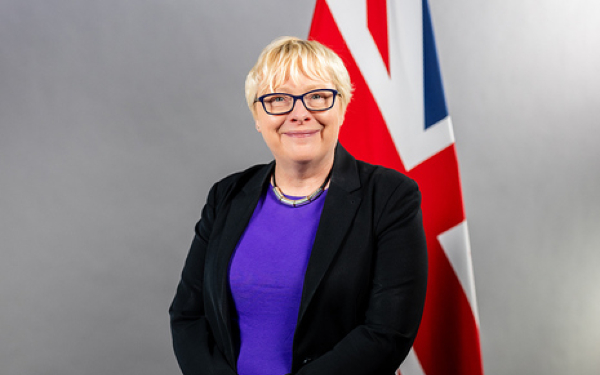
Minister for border security and asylum Angela Eagle (credit: Home Office)
The government is to test using artificial intelligence (AI) to estimate the age of unaccompanied asylum-seeking young people where this is disputed.
Should the trial, due to start later this year, prove successful, facial age estimation technology could be incorporated into age assessments of asylum seekers from next year, said border security and asylum minister Angela Eagle, in a ministerial statement today.
The technology, which is used by social media companies and online media companies to carry out age checks, produces an age estimate with a known degree of accuracy for an individual where this is unknown or disputed.
The Nationality and Borders Act 2022 enables the government to use so-called scientific methods in the age assessment of asylum-seeking young people, alongside the judgment of social workers.
This is despite the practice being vigorously opposed by social work, health and asylum organisations on grounds of concerns about accuracy and the human rights concerns.
The previous government issued regulations allowing for the use of X-rays of teeth and hand and wrist bones, and MRI scans of the collarbone and knee bones, as part of age assessments.
These have not been implemented and it is not current policy for the Home Office to commission scientific assessments.
However, in her statement, Eagle said the Home Office’s early assessments was that facial age estimation could “produce workable results much quicker than other potential methods of scientific or technological age assessment, such as bone X-rays or MRI scans, but at a fraction of the cost, and with no requirement for a physical medical procedure or accompanying medical supervision”.
The technology had been “trained on millions of images where an individual’s age is verifiable” and its quality had “improved rapidly” as it became more widely used by online retailers and social media sites, Eagle claimed.
She said the Home Office would issue a tender next month for a project to trial the use of facial age estimation in age assessments of asylum-seeking children, with testing due to begin later this year.
Subject to the results, “facial age estimation could be fully integrated into the current age assessment system over the course of 2026”, Eagle added.
In response to the news, a British Association of Social Workers (BASW) spokesperson said: “While we all want solutions that are faster and simpler, the reality is that assessing age is a complex process which should not be open to shortcuts.
“Social workers who specialise in Merton-compliant age assessment are highly skilled and trained in assessing age and protecting people’s rights and dignity in the process. This should never be compromised for a way of achieving quicker results.
“Additionally, it remains to be seen how precise facial age estimation technology is and, on this basis, it is questionable what real advantage it even provides. We would therefore urge the government to make clear how it will measure the effectiveness of this technology before committing to adopting it fully and work with us to seek the views of social workers before considering whether to proceed.”